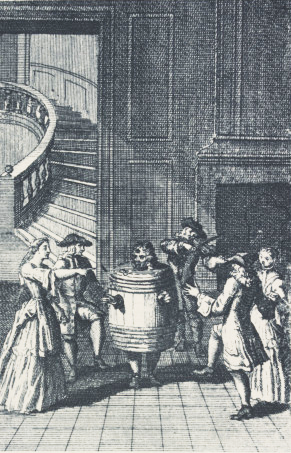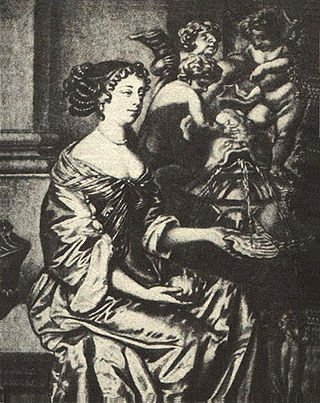
Aphra Behn was an English playwright, poet, prose writer and translator from the Restoration era. As one of the first English women to earn her living by her writing, she broke cultural barriers and served as a literary role model for later generations of women authors. Rising from obscurity, she came to the notice of Charles II, who employed her as a spy in Antwerp. Upon her return to London and a probable brief stay in debtors' prison, she began writing for the stage. She belonged to a coterie of poets and famous libertines such as John Wilmot, Lord Rochester. Behn wrote under the pastoral pseudonym Astrea. During the turbulent political times of the Exclusion Crisis, she wrote an epilogue and prologue that brought her legal trouble; she thereafter devoted most of her writing to prose genres and translations. A staunch supporter of the Stuart line, Behn declined an invitation from Bishop Burnet to write a welcoming poem to the new king William III. She died shortly after.

"Restoration comedy" is English comedy written and performed in the Restoration period of 1660–1710. Comedy of manners is used as a synonym for this. After public stage performances were banned for 18 years by the Puritan regime, reopening of the theatres in 1660 marked a renaissance of English drama. Sexually explicit language was encouraged by King Charles II (1660–1685) personally and by the rakish style of his court. Historian George Norman Clark argues:
The best-known fact about the Restoration drama is that it is immoral. The dramatists did not criticize the accepted morality about gambling, drink, love, and pleasure generally, or try, like the dramatists of our own time, to work out their own view of character and conduct. What they did was, according to their respective inclinations, to mock at all restraints. Some were gross, others delicately improper.... The dramatists did not merely say anything they liked: they also intended to glory in it and to shock those who did not like it.

The Country Wife is a Restoration comedy written by William Wycherley and first performed in 1675. A product of the tolerant early Restoration period, the play reflects an aristocratic and anti-Puritan ideology, and was controversial for its sexual explicitness even in its own time. The title contains a lewd pun with regard to the first syllable of "country". It is based on several plays by Molière, with added features that 1670s London audiences demanded: colloquial prose dialogue in place of Molière's verse, a complicated, fast-paced plot tangle, and many sex jokes. It turns on two indelicate plot devices: a rake's trick of pretending impotence to safely have clandestine affairs with married women, and the arrival in London of an inexperienced young "country wife", with her discovery of the joys of town life, especially the fascinating London men. The implied condition the Rake, Horner, claimed to suffer from was, he said, contracted in France whilst "dealing with common women". The only cure was to have a surgeon drastically reduce the extent of his manly stature; therefore, he could be no threat to any man's wife.

Mary Saunderson (1637–1712), later known as Mary Saunderson Betterton after her marriage to Thomas Betterton, was an actress and singer in England during the 1660s and 1690s. She is considered one of the first English actresses.
A Mad Couple Well-Match'd is a Caroline era stage play, a comedy written by Richard Brome. It was first published in the 1653 Brome collection Five New Plays, issued by the booksellers Humphrey Moseley, Richard Marriot, and Thomas Dring.

Cave Underhill (1634–1710?) was an English actor in comedy roles.

The Feign'd Curtizans, or, A Nights Intrigue is a 1679 comedic stage play by the English author Aphra Behn. Behn dedicated the play, originally performed at the Dorset Garden Theatre in London, to the well-known actress and mistress of King Charles II, Nell Gwyn.
The Forc'd Marriage; or, The Jealous Bridegroom is a play by Aphra Behn, staged by the Duke's Company on 20 September 1670 in Lincoln's Inn Fields, London, England. This sex tragicomedy ran for six nights, which granted Behn the house profits for both the third and six nights. It is considered her first staged play. Thomas Otway played a "probation part."
The Town-Fopp: or, Sir Timothy Tawdrey is a Restoration comedy written by Aphra Behn and first staged in 1676. It deals with an unhappy marriage and its dissolution.
The Younger Brother, or, The Amorous Jilt is a comedy written by Aphra Behn. The play was first performed and published posthumously in 1696, but was probably written in the late 1680s.
The False Count, Or, A New Way to play An Old Game is a comedic play written by Aphra Behn, first performed in 1681 and published in 1682. It was staged by the Duke's Company at the Dorset Garden Theatre in London. The cast included William Smith as Don Carlos, James Nokes as Francisco, John Freeman as Sebastian, John Wiltshire as Antonio, George Bright as Baltazer, Cave Underhill as Guzman, Anthony Leigh as Guilion, Elizabeth Currer as Isabella and Margaret Osborne as Jacinta.

Sir Patient Fancy: A Comedy, is a comedic play written by Aphra Behn, first performed in 1678. It is Behn's first overtly political play. It was staged by the Duke's Company at the Dorset Garden Theatre in London with a cast that included Nell Gwyn as Lady Knowell, Anthony Leigh as Sir Patient Fancy, John Crosby as Leander Fancy, Thomas Betterton as Wittmore, William Smith as Lodwick Knowell, James Nokes as Sir Credulous Easy, John Richards as Curry, Elizabeth Currer as Lady Fancy, Mary Betterton as Isabella, Emily Price as Lucretia and Anne Shadwell as Maundy.
John Bowman (1651–1739) was a British stage actor. He began his career in the Duke's Company at the Dorset Garden Theatre. In 1692, he married Elizabeth Watson, who acted under the name Elizabeth Bowman. He later switched to act at the Drury Lane Theatre. He is also referred to as John Boman.
William Bowen (1666–1718) was a British stage actor. He was part of the United Company from 1689. For a time, he became known for his comic roles. He was fatally wounded in a duel with fellow actor James Quin in 1718.
Joseph Williams was an English stage actor of the seventeenth and early eighteenth century.
Elinor Leigh was a British stage actor of the seventeenth century.
Elizabeth Currer was an Irish stage actress of the Restoration Era. She was a member of the Duke's Company during the 1670s and subsequently part of the merged United Company from 1682. Although she was likely acting in London several years earlier than this, her first known role was in The Conquest of China in 1675. Due to the irregular spelling of the time her surname is sometimes written as Carrier, Corer and Currier amongst other variants.
George Bright was an English stage actor of the seventeenth and early eighteenth century. He specialised in playing "comic dullards, fops and bouncy servants". After beginning his career in Dublin he joined the Duke's Company at the Dorset Garden Theatre in 1679 and then became part of the merged United Company in 1682.

The Counterfeit Bridegroom; Or, The Defeated Widow is a 1677 comedy play. The work's authorship is usually credited to Aphra Behn has been alternatively been attributed to Thomas Betterton. It was inspired by Thomas Middleton's Jacobean play No Wit, No Help Like a Woman's.
Charlotte Butler was an English stage actress and singer of the seventeenth century. She may have joined the Duke's Company in the 1670s, but her first definite recorded performance was in Aphra Behn's The Revenge (1680) The anonymous A Satyr on The Players describes her,









